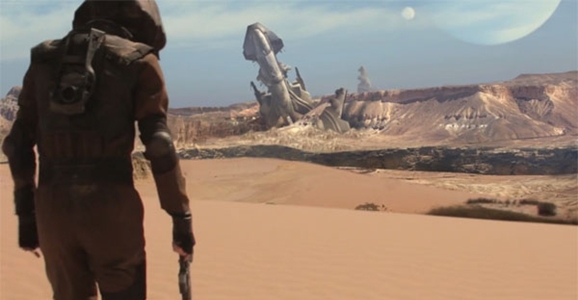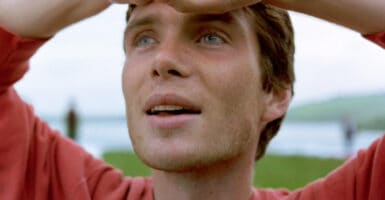Sci-Fi Shorts — Arrowhead: Signal Makes The Leap From Short Film To TV Movie
Stranded alone on a desert world, with only a computer for company.
This article is more than 2 years old
 When we first introduced GFR readers to the Australian science fiction short film Arrowhead: Signal last October, writer/director Jesse O’Brien was hoping to raise the funds to turn it into a full-length feature film. Last month word broke that Arrowhead would indeed be expanding beyond its original 10-minute running time: it’s becoming a full-length TV movie for the Australian network SF. Arrowhead is set to premiere sometime in 2014, and hopefully it will make its way online or beyond Australia at some point down the line.
When we first introduced GFR readers to the Australian science fiction short film Arrowhead: Signal last October, writer/director Jesse O’Brien was hoping to raise the funds to turn it into a full-length feature film. Last month word broke that Arrowhead would indeed be expanding beyond its original 10-minute running time: it’s becoming a full-length TV movie for the Australian network SF. Arrowhead is set to premiere sometime in 2014, and hopefully it will make its way online or beyond Australia at some point down the line.
In the meantime, we picked writer/director Jesse O’Brien’s brain to find out more about the origins and making of the project, as well as how the storyline of Arrowhead: Signal will expand for the full-length version. You can watch the short below, then dive into our Q&A with O’Brien.
Arrowhead is a tale of survival set amongst the distant stars. Kye is a prisoner of war caught between two armies that he doesn’t believe in. When offered an opportunity for freedom, Kye sets out on one last rescue mission, only to become stranded on a desert moon when his ship — the Arrowhead — crash lands. Kye has to learn to survive when we discovers a new life form that will challenge his very body and soul.
What was the genesis of Arrowhead: Signal? Was there one particular image, concept, or character you wanted to explore, or was it a case of multiple ideas converging?
Arrowhead: Signal is a short glimpse at the feature film’s story, a tiny piece of the puzzle which had already been written. I didn’t think the script would ever be set up or funded based on a verbal or written pitch. It read as too expensive and nobody is in the business of making big, high concept science fiction with first-time filmmakers — certainly not in Australia. So I set out with a small team of friends and we created a visual snapshot.
Ryan Stevens, who plays Kye in the short film, was instrumental in the creative process because he was my housemate at the time and we were able to spend months taking our time building the sets, props, and costume pieces until they were ready. But story was key, and we knew that we had to capture a small piece of this character’s overall journey. Everything about the feature film is expanded upon; the creature elements are particularly more prominent and essential to Kye’s character arc. But the heart of the story is Kye’s relationship with his computer REEF, and his longing for human connection. So I tried to write a small, subtle narrative that somehow portrayed all of these elements efficiently.
The original short relies almost entirely on the actor’s performance and visual storytelling, without the crutch of dialogue to lean on. Was this spare approach always something you wanted to do with Arrowhead?
Ryan Stevens is not an actor, so the decision to make Arrowhead: Signal as a silent film was a happy accident. If we had been more ambitious, we would have cast an actor and given him dialogue; one of the original drafts of the short film was to be shot entirely from REEF’s perspective, found-footage style as Kye talks into camera like a video diary. I believe it was called Arrowhead: Captain’s Log which is a terrible title. Thankfully, this never came into fruition, and the silent, more visual approach is one of the aspects of the short film people really respond to.
It reminded me of how so many great movies that I grew up on were born out of restrictions — Lucas and Spielberg having to find creative ways to solve problems — rather than today’s mentality of ‘if you can dream it, we can do it.’ Being forced into a corner is something our short film definitely benefited from. Our unspoken motto was to make the most of what we had, and I think people could sense that because of the naturalistic tone that I wish I could say was 100% intentional.
Given how simple the original short is, how do you plan to expand it to the larger canvas of a TV movie? The synopsis says Kye is initially caught up in a war, so will we see much of that period of his life, or will the focus be entirely on his being stranded on the alien world?
I’d like to keep a lot of the story a secret so that it’s more impactful when you can finally see it, but we do get glimpses of where Kye was before becoming stranded. There’s an exciting opening sequence that I can’t wait to show people, and I think it will be really surprising. The bulk of the movie is grounded in what people know and appreciate from the short film. But there are bookends which expand the world and help create an arc for Kye. It’s a big world we’re trying to create, a universe full of potential for other stories. But we’re not doing that at the expense of this particular story’s intimacy. It’s important that we keep the movie focused, yet at the same time create a sense that Kye has got other places to be, anywhere but here, and that he’s part of a larger, exciting universe.
What has been the most difficult part of making Arrowhead so far, and its transition to feature length? The most satisfying?
Scaling the story down has been the most challenging task so far. The original draft of Arrowhead was a long, ‘bullets-and-sand’ epic, still focusing on Kye’s years stranded alone but with bigger battles, many more characters, and glimpses at other worlds. In retrospect, having to rewrite and rewrite until we could get the movie down to a more manageable budget has been a blessing in disguise. I was forced to remove some things that I really loved, but which now feel out of place. There’s nothing wrong with tightening and focusing a script. If I’m at the cinema, I’d rather a movie give me just enough to be satisfying, but leave me wanting more. If we jam-packed the movie with visual excess and too many characters, logistically we’d be trying too much, and from the audience’s perspective it’d leave nothing to the imagination.
So that’s been a real challenge, but being able to look at a script that feels tighter and more to the point is very satisfying. Before the work begins, rewriting is incredibly daunting and you don’t even know where to begin. But when it’s finished, it just feels like you’re moving closer and more prepared towards the goal of making the movie. I’m sure we’ll be rewriting in some way until the minute before people see it.
Are there any science fiction dream projects that you’d like to tackle in the future?
I have a few ideas I’d love to adapt. One of my favourite properties as a kid, something that really sparked my imagination, is still untouched. A lot of great projects are happening to filmmakers who only a few years ago were dreamers like me, and who are now putting their touch on the movie franchises that made them who they are. I can only hope to one day be that lucky. But before I sound like I want a career making sequels and reboots, I’m cautious about them. While I hope for every one of them to be great, it’s a fine line trying to recapture what people loved about the originals. So putting the inner fanboy aside, my dream is to be able to keep making movies after this first one, and for there to be a variety among them. I have several original ideas, not all of which are science fiction, but which come from the same place in my mind that wants to capture things out of the ordinary.
What appeals to you, as a filmmaker, about the genre of science fiction?
What I love about science fiction is that it allows me to walk into a movie and see something I’ve never seen, and go to places I can’t go to in reality. Watching Alien as a kid terrified me beyond words but it also stuck with me in a profound way. I didn’t know it at the time, but it was because I’d been introduced to a world that drew me outside of my own and into an artificial one. Science fiction is unique in that it’s mostly done badly, in my opinion. The weak entries in the genre greatly outweigh the classics, because it’s so hard to get right. But if I had to name my top ten favourite movies, most of them would happen to be science fiction. If people feel like Arrowhead takes them out of reality for two hours, and imagine themselves in this world that somehow manifested out of our crew’s heads and sweat and tears, then we’ll have done something right. And if nothing happens and people don’t connect with it, then, well, the next one will be better!












